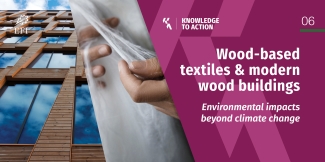New EFI report on wood-based textiles & modern wood buildings

A new study led by EFI’s Timokleia (Cleo) Orfanidou and Mariana Hassegawa sets out to explore the potential non-climate environmental impacts of wood-based textile fibres and modern wood buildings.
The production and use of wood-based textile fibres and engineered wood products in buildings have grown in popularity in recent years due to the potential for carbon storage and greenhouse gas emission reductions. Other environmental impacts, such as acidification, water and air pollution, or biodiversity loss, are reported as potentially being associated with the processing, manufacturing, use, and disposal of (wood) products. Currently these impacts are not fully understood. At the same time, there are no systematic studies available on the non-climate environmental impacts that occur throughout the life cycle stages of wood-based textile fibres and modern wood buildings.
The new EFI report on wood-based textile fibres and modern wood buildings is based on comparative life cycle assessment (LCA) studies and interviews with experts. The authors present the foreseen technological developments that support the development of wood-based fibres and modern wood buildings towards environmental sustainability. They also provide insight into the limitations to the development of wood-based textile fibres and modern wood buildings.
”We should always consider the environmental sustainability of the products throughout their life cycle, regardless of whether the feedstock is derived from renewable sources. Both wood-based textiles and modern wood buildings have grown in popularity in recent years, for a number of reasons, but we should not overlook the environmental impacts that can arise in addition to climate change”, says Cleo Orfanidou.
"Several initiatives to develop wood-based textiles and modern engineered wood products are currently underway. The recent boost in the construction of modern wood buildings is evidence of the interest in choosing alternatives to fossil-based and non-renewable materials. We expect that the increase in popularity of these solutions stimulates more investments towards the development of wood-based products with even smaller environmental impacts", adds Dr Hassegawa.
The authors highlight three lessons that can be learned when looking into wood-based textile fibres and modern wooden buildings from a life cycle perspective:
- It is critically important to improve the metrics used for quantifying environmental impact indicators, especially related to the variety of factors that influence the environmental sustainability of forest products. Standard LCA studies that are used to quantify environmental impacts do not represent realistic scenarios for natural systems such as forests, requiring a rethinking of the applicability of these LCA impact assessment methods, indicators, and their metrics.
- We need to invest in R&D to support the development of sustainable materials and circularity of new wood-based products over their entire life cycle. Environmental sustainability considerations and circularity need to be incorporated in the early stages of product design. The reduction of harsh chemical use and a reduction of the overall chemical input is key.
- Investment in technologies to further improve energy efficiency, thus further reducing the reliance on fossil energy is required. The energy mix used in product manufacturing is an important factor that contributes to improving the environmental profile of both industries. Preference should be given to renewable energy sources in the production processes, especially opting for non-woody biomass. Wood should be preferably used as a raw material for products rather than for energy in the production process.
The report is available here: https://doi.org/10.36333/k2a06
Full citation: Orfanidou, T., Hassegawa, H., Leskinen, P., Sixta, H., Oinas, P., Cardellini, G. 2023. Wood-based textiles & modern wood buildings. Knowledge to Action 6, European Forest Institute. https://doi.org/10.36333/k2a06
More information: cleo.orfanidou @ efi.int and mariana.hassegawa @ efi.int


